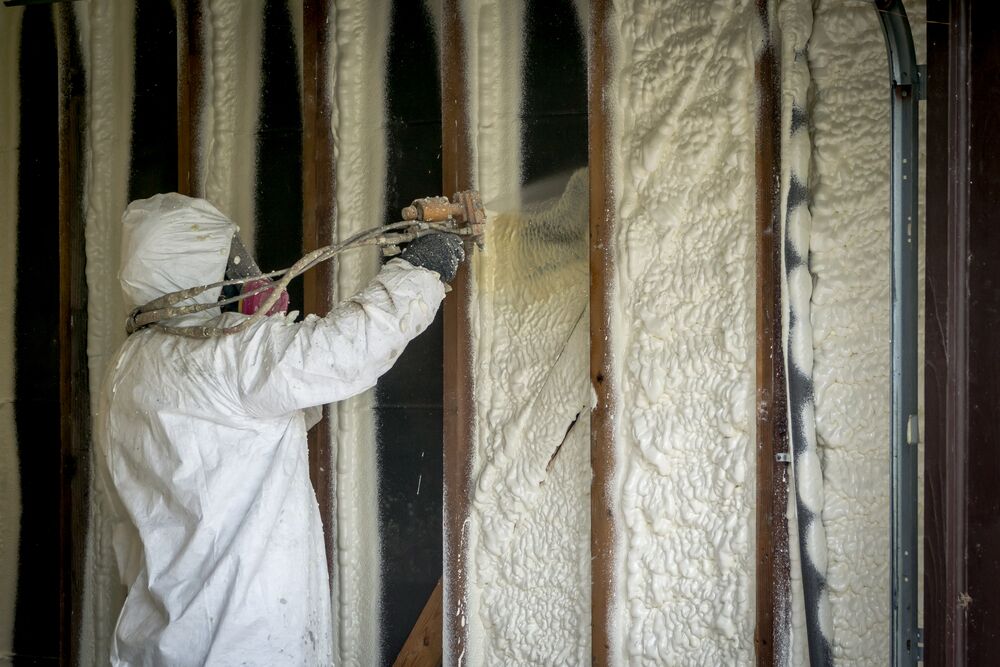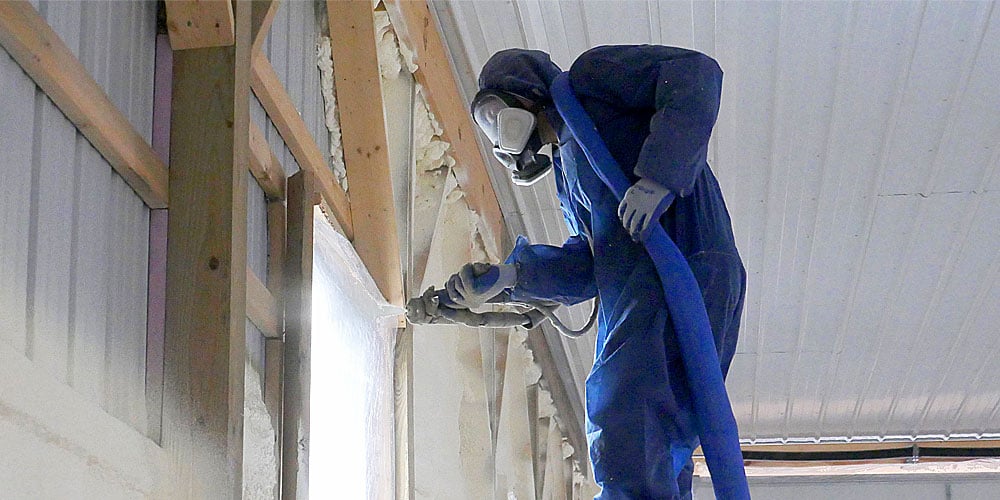Tips for Preserving Your Spray Foam Insulation for Long-Term Performance
Tips for Preserving Your Spray Foam Insulation for Long-Term Performance
Blog Article
Spray Foam: The Ultimate Solution for Air Sealing and Insulation
Spray foam insulation has actually arised as a leading remedy for effective air securing and thermal insulation, using a special combination of buildings that establish it apart from standard methods. Comprehending the full range of its benefits, installation processes, and comparisons with various other insulation types is crucial for making educated decisions.
What Is Spray Foam?
Spray foam is a flexible insulation product that incorporates the concepts of air sealing and thermal resistance to improve energy effectiveness in buildings. Composed largely of polyurethane or various other similar compounds, spray foam is applied as a fluid that increases upon contact with surfaces, producing a solid, continual layer of insulation. This special property allows it to load spaces, cracks, and gaps that typical insulation products might overlook, offering an exceptional air seal.
There are two major sorts of spray foam: open-cell and closed-cell. Open-cell spray foam is lighter and extra adaptable, using superb audio absorption and a lower R-value per inch - Spray Foam. On the other hand, closed-cell spray foam is denser, giving a greater R-value, dampness resistance, and added architectural honesty to developing components
The application process usually includes specialized devices, making certain a seamless application that sticks to numerous substrates, consisting of concrete, wood, and steel. This flexibility makes spray foam appropriate for both brand-new constructions and retrofitting existing frameworks. Its ability to create a closed barrier substantially adds to minimizing power consumption and improving indoor air quality, thus making it a favored option amongst homeowners and builders alike.
Benefits of Spray Foam Insulation
One of one of the most considerable benefits of spray foam insulation is its exceptional capacity to develop a continual air obstacle, which properly reduces power loss. Unlike traditional insulation products, spray foam increases to fill up cracks and spaces, making certain that air leak is significantly reduced. This particular not just improves power efficiency however additionally causes reduce utility bills in time.
In addition, spray foam insulation offers premium thermal resistance, adding to a much more secure indoor environment. Its high R-value per inch permits reliable insulation in confined spaces, making it ideal for attics, wall surfaces, and crawl areas. The moisture-resistant residential properties of spray foam help stop mold and mildew and mildew development, promoting healthier living conditions.
An additional crucial benefit of spray foam insulation is its sound-dampening high qualities (Spray Foam). It efficiently decreases sound transmission between areas, developing a quieter and more comfy home environment. The longevity of spray foam additionally stands apart, as it does not sag or work out gradually, preserving its efficiency throughout its life-span
Just How Spray Foam Functions
Comprehending exactly how spray foam insulation functions is vital for valuing its performance in air sealing and thermal resistance. Spray foam insulation contains two key elements: isocyanate and polyol resin. When these parts are mixed, they undertake a chemical response that creates the product to expand rapidly, producing a dense foam that fills up cracks, spaces, and dental caries.
As the foam broadens, it sticks to surface my company areas, forming an airtight seal that substantially lowers air seepage. This characteristic makes spray foam insulation extremely reliable at protecting against drafts and wetness penetration, which can lead to power loss and damage gradually. In addition, the closed-cell variation of spray foam offers remarkable thermal resistance as a result of its inflexible framework, successfully lessening warm transfer.
The distinct residential properties of spray foam allow it to satisfy irregular surfaces, guaranteeing thorough insurance coverage and a smooth obstacle. Because of this, spray foam insulation not just enhances power efficiency however also adds to improved indoor air top quality by minimizing the accumulation of pollutants and allergens. Inevitably, recognizing the technicians behind spray foam emphasizes its role as a remarkable selection for insulation and air securing in both commercial and residential applications.
Installment Refine Summary

Before installation, the room needs to be sufficiently cleaned up and prepped, making certain that surface areas are without wetness, dust, and particles. Since impurities can jeopardize bond and total performance, this action is essential. Once the location is prepared, the application includes mixing the two parts of the spray foam, which expands upon contact and loads gaps successfully.
Trained specialists must perform the installment, using specialized tools to make certain uniform coverage and optimal thickness. Safety precautions, including putting on protective gear and making certain proper air flow, are critical during this procedure. After application, the foam typically treatments rapidly, creating a solid barrier that boosts energy performance.
Comparing Spray Foam to Conventional Insulation
When examining insulation choices, spray foam insulation stands out in contrast to conventional materials such as fiberglass and cellulose. Unlike fiberglass and cellulose, which can enable air infiltration, spray foam broadens upon application, filling voids and holes to produce a closed seal.
Additionally, spray foam gives a higher R-value per inch than traditional insulation types, using even more reliable thermal resistance in a thinner account. This characteristic is especially advantageous in areas with restricted cavity depth. Spray foam is resistant to dampness and mold and mildew growth, which can be a significant issue with cellulose and fiberglass, specifically in moist settings.
However, spray foam insulation normally carries a higher in advance expense than its typical equivalents. Property owners must consider this initial financial investment against long-lasting power cost savings and efficiency advantages. Ultimately, while both insulation kinds serve their purpose, spray foam arises as an advanced service for modern-day insulation needs, particularly in regards to air Discover More Here sealing and thermal efficiency.

Final Thought
In recap, spray foam insulation represents a very effective remedy for achieving optimal air sealing and thermal resistance. Its unique residential or commercial properties, consisting of moisture resistance and sound dampening, make it ideal for various applications in both new building and constructions and retrofitting projects (Spray Foam). The preliminary costs may be higher compared to traditional insulation products, the lasting advantages, such as considerable energy financial savings and improved interior air high quality, warrant the financial investment and imp source underscore its value in contemporary structure practices.
Spray foam insulation has arised as a leading service for reliable air sealing and thermal insulation, providing a distinct combination of residential properties that set it apart from typical techniques.Spray foam is a flexible insulation material that combines the concepts of air sealing and thermal resistance to boost energy efficiency in structures.When assessing insulation alternatives, spray foam insulation stands out in comparison to typical materials such as fiberglass and cellulose. Ultimately, while both insulation kinds offer their objective, spray foam emerges as an extra innovative option for contemporary insulation demands, particularly in terms of air sealing and thermal effectiveness.
In recap, spray foam insulation represents a highly efficient service for accomplishing ideal air securing and thermal resistance.
Report this page